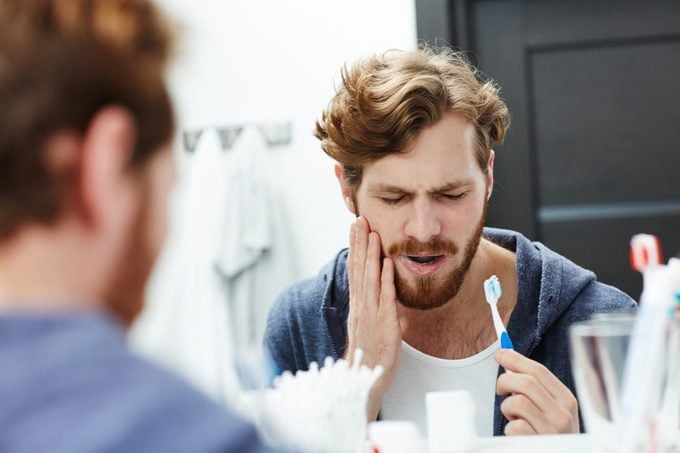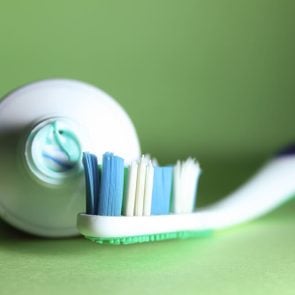Why You May Have Tooth Sensitivity After a Filling
Updated: May 07, 2021
Have pain and sensitivity after a dental filling? Here's why—and when to reach back out to your dentist for treatment.
Dental pain and fear
When it comes to phobias and fears, dread about going to the dentist is right up there with clowns and public speaking.
“Most people dread going to the dentist due to a bad childhood experience that has stayed with them through life,” says Geoffrey R. Morris, DMD, MS.
“Visiting the dentist can make some patients feel especially vulnerable,” agrees Greg Gelfand, DDS. “Dental procedures have a reputation for being painful, but through the many advances in the field, many procedures are now significantly more efficient and notably more painless.”
Unfortunately, while this fear (also known as dentophobia or odontophobia) is common, avoiding the dentist can be the first step toward poor tooth hygiene and an increased number of cavities. Because cavities frequently lead to tooth sensitivity and pain from the resulting fillings, the cycle keeps repeating.
But why are teeth sensitive after fillings in the first place? We spoke with dentists to get the scoop behind why your teeth may hurt after a filling, as well as to get tips on how to manage and treat tooth sensitivity.
What is a tooth filling and why do you need one?
First things first: what is a tooth filling?
Christopher Norman, DDS, explains that a tooth filling replaces lost tooth structure. “When a tooth breaks, fractures, or has a cavity, it is necessary to replace the missing or affected tooth with a dental filling so that the condition does not get worse.”
The filling should help so you don’t experience sensitivity from cold foods or from chewing.
“A modern tooth filling is a resin-based material that has been infiltrated with a glass-like material,” adds Dr. Morris, explaining, “It is used as a biocompatible replacement of the tooth structure lost from decay.”
Fillings can be made of various types of metal—commonly referred to as “silver fillings”—or from dental resins, which are often called “tooth-colored fillings,” says Dr. Norman.
Dr. Gelfand warns what can happen when you don’t take care of your teeth.
“If left untreated, it can lead to fractured teeth and/or infection and can oftentimes necessitate more invasive, costly dental treatment.”
How common are cavities?
According to Dr. Norman, an estimated 90 percent of adults aged 20 to 64 have had a cavity in an adult tooth that needs a filling.
“The prevalence of cavities varies greatly from patient to patient depending on certain genetic and environmental risk factors,” he says. “One of the reasons that cavities are so common in our population is because of the number of acidic beverages and amount of processed sugar that we consume as adults.”
Cavities are most common from childhood to teenage years and tend to taper off from there, says Dr. Morris. “However, cavities can occur at any age due to poor hygiene.”
Dr. Gelfand explains that cavities are so common, they might not even cause pain. “Cavities are quite commonly found lurking between teeth, only uncovered with an x-ray, which underscores the importance of routine check-ups. If found in the earlier stages, cavities can be treated in a minimally-invasive way and can prevent the need for more dental work.”
However, while smaller cavities might only cause mild sensitivity and require a filling, deeper cavities cause more discomfort and require more extensive treatment, says Dr. Gelfand.
“Early detection is key because by treating a smaller cavity at its onset, you can potentially avoid future, more involved treatment,” Dr. Gelfand says.
Why do people have tooth sensitivity after a filling?
Often it depends on how close the decay in the tooth is in relation to the nerve of the tooth.
“The most common reason for post-operative sensitivity is due to inflammation of the nerve,” says Dr. Morris. “When a filling is needed, the dentist must first remove all decay. If the cavity was in close proximity to the nerve, the nerve may become inflamed.”
Where your bite comes together on the filling also can be too high, putting the tooth under too much pressure, causing it to be sensitive, says Dr. Norman. There could also have been a complication during the placement of the filling which means it needs to be replaced.
In other cases, it could be down to the filling itself, Dr. Latner explains.
“We try to do a meticulous job. You have to keep saliva and moisture away from the tooth where you’re putting the filling in. If sometimes those things get contaminated, the filling doesn’t bond well, thus the patient can get sensitivity, especially when biting on the tooth.”
Sensitivity to the materials used in the filling, as well as to heat and cold, are other potential factors.

How long does this sensitivity usually last?
“Tooth sensitivity varies greatly, but average sensitivity following a dental filling typically lasts a few days and potentially a few weeks,” says Dr. Norman.
Typically, unless it’s a deep cavity, Dr. Latner will recommend patients use their teeth normally after the numbness wears off.
“Brush, floss, eat on it, even if it’s sensitive,” he says. “Assuming it’s a healthy tooth, it’ll accommodate to the filling, which will involve the nerve shrinking to put more distance between it and the filling.”
However, Dr. Morris warns that special cases might warrant a further look.
“The length of post-operative sensitivity depends on the underlying reasoning. Although most tend to dissipate after a few days to a week, if the bite is off or decay was extremely deep, it may not go away and further treatment may be needed.”
When should people reach out to their dentist?
Dr. Latner expects most tooth sensitivity shouldn’t last more than a few days, a week or so at most. “If the pain is increasing, reach out to your dentist quicker.”
If you’ve had sensitivity for more than a few days, it’s time to check in with your dentist, Dr. Gelfand agrees. “Have your dentist recommend the best course of action: whether you should wait and expect the discomfort to subside, or if your case requires further treatment.”
“This is where your post-operative instructions from your dentist are very important,” explains Dr. Norman.
“If they tell you that it was a routine filling and you are still having sensitivity after a few weeks then it would be a good idea to reach out to the office. If it was a ‘deep’ filling and the sensitivity is starting to improve then it may not be necessary for a follow-up visit.”
And while sensitivity post-filling is common, says Dr. Gelfand, it could be something worse. “If you have prolonged sensitivity, that may be a sign of nerve damage, necessitating a root canal to alleviate discomfort.”
(Here’s exactly what to expect if you need a root canal.)
How to feel more relaxed at the dentist
Back to that dentophobia. Pain following a treatment isn’t likely to warrant you rushing back for more. But taking proper care of your teeth is extremely important, so ignoring the pain and hoping it will go away isn’t the best course of action.
“Dentistry has come a long way over the past 80-plus years and the experiences that our parents and grandparents had should not happen with modern visits to the dentist,” Dr. Norman says.
“Pain and fear of pain are two of the biggest reasons that people avoid the dentist, but with the advances we have made in dentistry it is possible now to deliver near pain-free dentistry in almost any circumstance.”
Thanks to 3D scanners and high-res cameras, patients can now see exactly what’s happening and hopefully reduce the fear of the unknown.
And ultimately, it’s critical to make sure you’re choosing a dentist you trust in the first place, says Dr. Norman, so that you feel more comfortable reaching out if sensitivity persists.
“The most important thing for patients when establishing care with a dentist is to find an office that fits what they are looking for in terms of atmosphere, approach to treatment, and rapport with the dentist. Once a patient finds an office that fulfills these basic requirements they will be set up for dental success for years to come.”
Next up, check out these 10 tips for whiter teeth.



